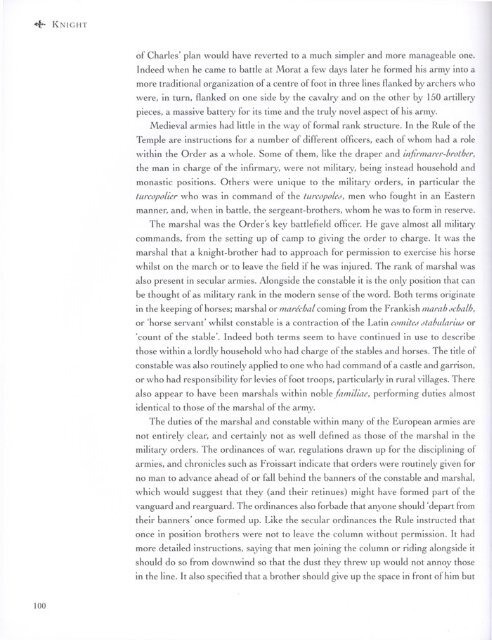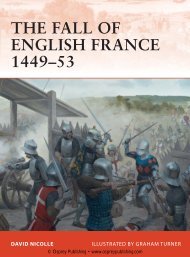Osprey - General Military - Knight - The Warrior and ... - Brego-weard
Osprey - General Military - Knight - The Warrior and ... - Brego-weard
Osprey - General Military - Knight - The Warrior and ... - Brego-weard
Create successful ePaper yourself
Turn your PDF publications into a flip-book with our unique Google optimized e-Paper software.
100<br />
KNIGHT<br />
of Charles' plan would have reverted to a much simpler <strong>and</strong> more manageable one.<br />
Indeed when he came to battle at Morat a few days later he formed his army into a<br />
more traditional organization of a centre of foot in three lines flanked by archers who<br />
were, in turn, flanked on one side by the cavalry <strong>and</strong> on the other by 150 artillery<br />
pieces, a massive battery for its time <strong>and</strong> the truly novel aspect of his army.<br />
Medieval armies had little in the way of formal rank structure. In the Rule of the<br />
Temple are instructions for a number of different officers, each of whom had a role<br />
within the Order as a whole. Some of them, like the draper <strong>and</strong> infirmarer-brother,<br />
the man in charge of the infirmary, were not military, being instead household <strong>and</strong><br />
monastic positions. Others were unique to the military orders, in particular the<br />
turcopolier who was in comm<strong>and</strong> of the turcopoled, men who fought in an Eastern<br />
manner, <strong>and</strong>, when in battle, the sergeant-brothers, whom he was to form in reserve.<br />
<strong>The</strong> marshal was the Order's key battlefield officer. He gave almost all military<br />
comm<strong>and</strong>s, from the setting up of camp to giving the order to charge. It was the<br />
marshal that a knight-brother had to approach for permission to exercise his horse<br />
whilst on the march or to leave the field it he was injured. <strong>The</strong> rank of marshal was<br />
also present in secular armies. Alongside the constable it is the only position that can<br />
be thought of as military rank in the modern sense of the word. Both terms originate<br />
in the keeping of horses; marshal or marechal coming from the Frankish marah dchalh,<br />
or 'horse servant' whilst constable is a contraction of the Latin comites dtabulariud or<br />
'count of the stable'. Indeed both terms seem to have continued in use to describe<br />
those within a lordly household who had charge of the stables <strong>and</strong> horses. <strong>The</strong> title of<br />
constable was also routinely applied to one who had comm<strong>and</strong> of a castle <strong>and</strong> garrison,<br />
or who had responsibility for levies of foot troops, particularly in rural villages. <strong>The</strong>re<br />
also appear to have been marshals within noble familiae, performing duties almost<br />
identical to those of the marshal of the army.<br />
<strong>The</strong> duties of the marshal <strong>and</strong> constable within many of the European armies are<br />
not entirely clear, <strong>and</strong> certainly not as well defined as those of the marshal in the<br />
military orders. <strong>The</strong> ordinances of war, regulations drawn up for the disciplining of<br />
armies, <strong>and</strong> chronicles such as Froissart indicate that orders were routinely given for<br />
no man to advance ahead of or fall behind the banners of the constable <strong>and</strong> marshal,<br />
which would suggest that they (<strong>and</strong> their retinues) might have formed part of the<br />
vanguard <strong>and</strong> rearguard. <strong>The</strong> ordinances also forbade that anyone should depart from<br />
their banners' once formed up. Like the secular ordinances the Rule instructed that<br />
once in position brothers were not to leave the column without permission. It had<br />
more detailed instructions, saying that men joining the column or riding alongside it<br />
should do so from downwind so that the dust they threw up would not annoy those<br />
in the line. It also specified that a brother should give up the space in front of him but







